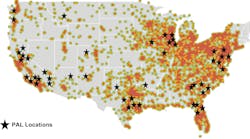In May consumer spending was bolstered by a rise in personal income, according to a report released by the U.S. Bureau of Economic Analysis (BEA).
Personal consumption expenditures increased 1%, while disposable personal income and personal income both rose 0.6%.
Steve Latin-Kasper, NTEA (National Truck Equipment Assn.) market data and research director says this means that there are more jobs, higher wages, and more spending— and that means more freight movement.
The increase in all three of the major indexes in the BEA report implies one conclusion, Latin-Kasper said. “If jobs are increasing, income is increasing- therefore, consumption is increasing. People are spending more because they are making more.”
This, in turn, directly affects the trucking industry, Latin-Kasper said, pointing to overall low inventories as a result of consumer spending. “Consumption can’t increase if the stuff isn’t there to get consumed, which leads us to carriers performing nearly at capacity. The amount of freight that has been shipped has increased steadily.”
Separately, Federal Reserve officials are meeting today to discuss interest rates. Indications of higher income and consumption contribute indirectly to inflationary pressures that could tip the Feds in favor of ratcheting up rates.
“When you have increases in personal income, that leads to consumption increases,” Latin Kasper said. “Prices then go up because supply usually lags behind, which leads to inflation. Once inflation starts, that’s when the Federal Reserve becomes concerned.”
The Fed’s expected decision to increase rates is one that many economists believe has been long overdue. “The guys at the Fed try to beat it [inflation] before it happens, but this time they’ve slow at it. It’s not so high that they have to do something drastic, but there’s no doubt in anyone’s mind that they’re going to raise rates,” noted Latin-Kasper.


